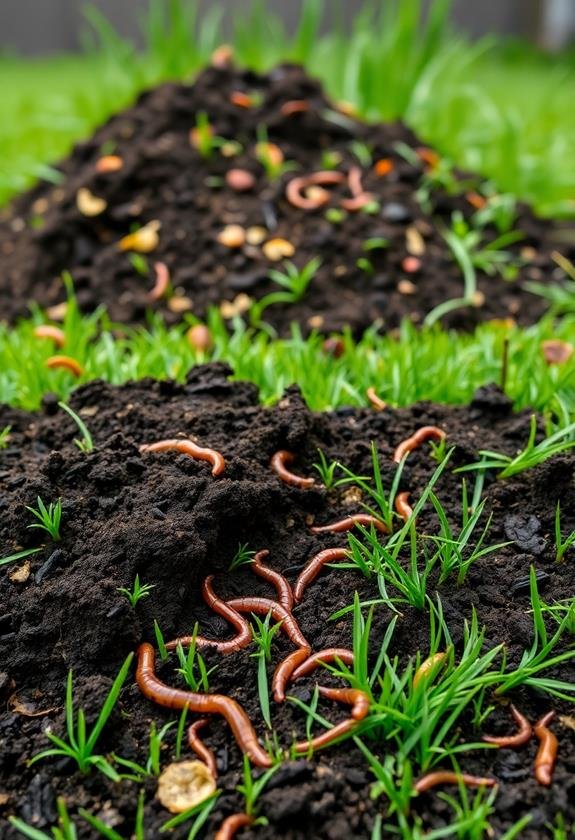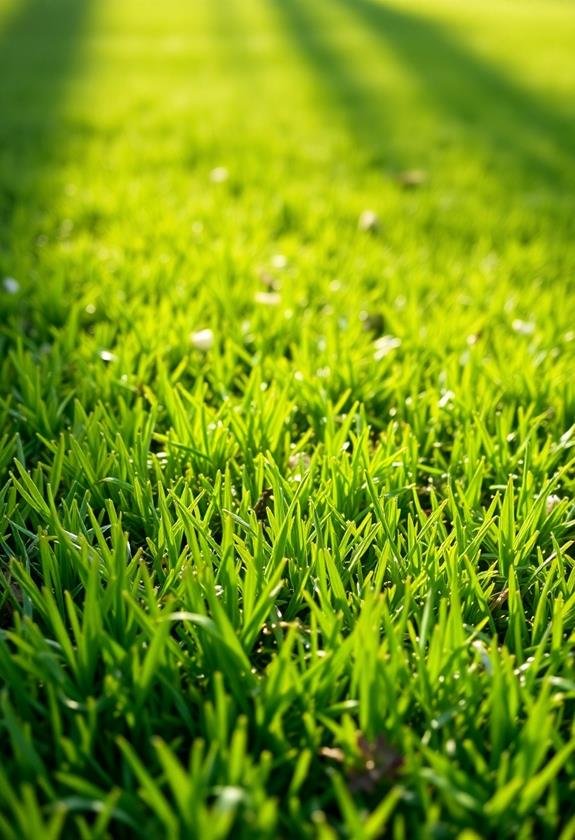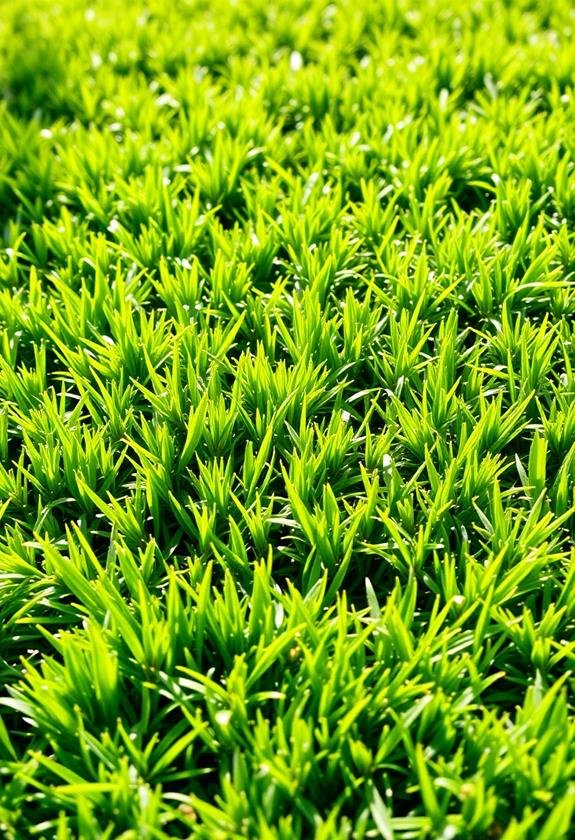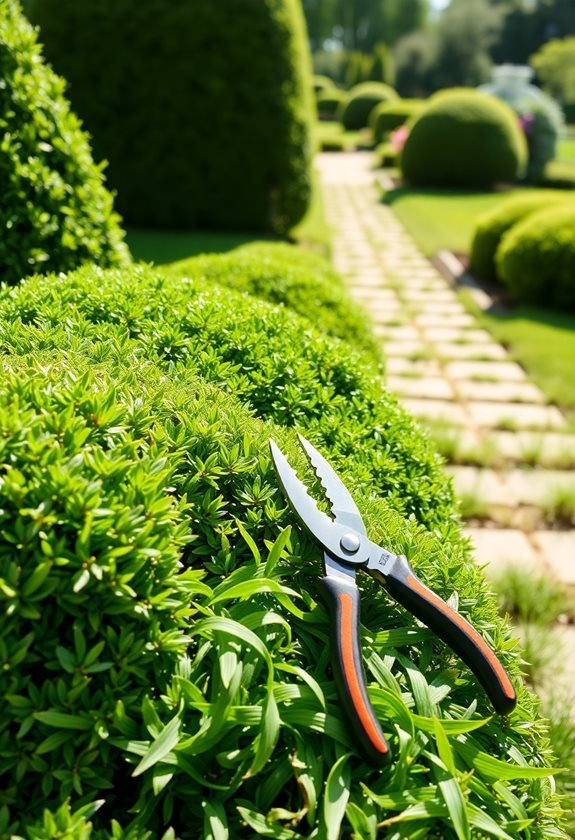You’ll transform your lawn into a lush, healthy oasis with these seven organic fertilizers. Compost, nature’s perfect blend, improves soil structure and supports beneficial microorganisms. Fish emulsion provides a quick nutrient boost, while grass clippings offer a free, nitrogen-rich option. Bone meal strengthens roots, and seaweed extract reduces stress on your lawn. Manure-based fertilizers pack a nutrient punch, and coffee grounds deter pests while feeding your grass. I’ve had great success using a combination of these on my own lawn, and I love how they’re eco-friendly and sustainable. Stick around, and I’ll share some application tips to help you get the most out of these natural lawn boosters.
Key Takeaways
- Compost improves soil structure and provides essential nutrients for a thriving lawn ecosystem.
- Fish emulsion offers quick-acting nutrients, ideal for boosting grass growth in spring or reviving stressed lawns.
- Grass clippings left on the lawn after mowing act as a natural, nitrogen-rich fertilizer.
- Bone meal promotes strong root growth and maintains optimal soil pH for most grass types.
- Seaweed extract enhances lawn resilience against stress factors while providing numerous trace minerals.
Compost: Nature’s Perfect Fertilizer

Nature’s brilliance shines through in compost, the ultimate organic fertilizer for your lawn.
You’ll be amazed at how this dark, crumbly mixture can transform your grass into a lush, green oasis. I’ve been using compost for years, and let me tell you, it’s like magic for your turf!
Here’s why compost is so fantastic:
- Nutrient-rich: It’s packed with essential elements your lawn craves.
- Improves soil structure: Say goodbye to compaction and hello to better drainage.
- Supports beneficial microorganisms: These tiny helpers keep your soil healthy.
To create your own compost, follow these steps:
- Collect kitchen scraps (no meat or dairy)
- Add dry leaves and grass clippings
- Turn the pile regularly
- Keep it moist, but not soggy
Pro tip: If you’re short on time, you can always buy ready-made compost. Just sprinkle it over your lawn in spring and fall, about 1/4 inch deep.
Trust me, your grass will thank you!
Fish Emulsion
While compost reigns supreme in the organic fertilizer world, another potent option lurks beneath the waves. Fish emulsion, a liquid fertilizer made from fish byproducts, is a powerhouse of nutrients for your lawn.
I’ve been using it for years, and let me tell you, it’s like giving your grass a gourmet seafood dinner!
Here’s why you’ll love fish emulsion:
- Nutrient-rich: It’s packed with nitrogen, phosphorus, and potassium (NPK), the holy trinity of plant nutrition.
- Quick-acting: Your lawn will start showing results in just a few days.
- Versatile: Use it on grass, flowers, and even vegetables.
But fair warning: it can be a bit smelly. I once applied it before a backyard barbecue, and my guests thought I was grilling fish!
To avoid this faux pas:
- Apply early in the morning or evening
- Water thoroughly after application
- Dilute according to package instructions
Fish emulsion is especially great for:
- Boosting growth in spring
- Reviving stressed lawns
- Providing a midseason pick-me-up
Grass Clippings

Here’s the scoop: Grass clippings are packed with nitrogen, potassium, and phosphorus – the holy trinity of lawn nutrients. When you leave them on your lawn after mowing, they break down quickly, returning these goodies to the soil. It’s like giving your grass a free, all-natural snack!
To make the most of your clippings:
- Mow regularly, cutting no more than 1/3 of the grass blade’s length.
- Use a mulching mower to chop clippings into smaller pieces.
- Spread clippings evenly across the lawn.
Pro tip: If you’ve let your grass grow too long, rake up the excess clippings to avoid smothering the lawn. You can add these to your compost pile or use them as mulch in your garden beds. It’s a win-win for your whole yard!
Bone Meal
Bone meal is a powerhouse organic fertilizer that’s rich in phosphorus and calcium. It’s a fantastic addition to your lawn care routine, especially if you’re looking to promote strong root growth and vibrant blooms.
I remember the first time I used bone meal in my garden – the results were nothing short of amazing!
Here’s why you should consider using bone meal:
- Slow-release nutrients: Unlike synthetic fertilizers, bone meal releases nutrients gradually, providing long-lasting benefits to your lawn.
- pH balancing: It helps maintain a slightly acidic soil pH, which is ideal for most grass types.
- Eco-friendly: As a natural byproduct, it’s an environmentally conscious choice.
To apply bone meal:
- Spread it evenly across your lawn at a rate of 10 pounds per 100 square feet.
- Water thoroughly after application to help it settle into the soil.
- Reapply every 3-4 months during the growing season.
Pro tip: Bone meal can attract animals, so consider mixing it with coffee grounds to deter critters.
Trust me, your lawn will thank you for this nutrient-packed boost!
Seaweed Extract
Seaweed extract is another organic powerhouse for your lawn. You’ll be amazed at how this marine marvel can transform your turf! I’ve been using it for years, and let me tell you, it’s like giving your grass a seaside vacation.
Here’s why seaweed extract is so fantastic:
- Nutrient-rich: It’s packed with over 60 trace minerals and essential elements.
- Growth stimulant: Promotes root development and overall plant health.
- Stress reducer: Helps your lawn cope with drought, heat, and disease.
To apply seaweed extract, you’ve got options:
- Liquid form: Mix with water and spray evenly.
- Granular: Sprinkle over the lawn and water in.
Pro tip: Combine seaweed extract with your regular fertilizer routine for a one-two punch of lawn-loving goodness. I like to apply it in spring and fall for best results.
Manure-Based Organic Fertilizers
Numerous gardeners swear by manure-based organic fertilizers for their lawns. It’s no wonder why – these natural powerhouses are packed with nutrients that’ll make your grass grow thick and lush.
I’ve been using them for years, and let me tell you, the results are impressive!
You’ll find several types of manure-based fertilizers on the market:
- Cow manure: A classic choice, rich in nitrogen and organic matter
- Horse manure: Great for improving soil structure
- Chicken manure: High in nitrogen, but use sparingly to avoid burning
When applying manure-based fertilizers, remember:
- Always use composted manure to avoid burning your lawn
- Spread it evenly across the grass, about 1/4 inch thick
- Water thoroughly after application
Pro tip: Mix manure with compost for an extra nutrient boost. Your lawn will thank you!
One word of caution: the smell can be… let’s say, “earthy.”
But don’t let that deter you – the benefits far outweigh any temporary odor. Trust me, your neighbors will be green with envy (pun intended) when they see your thriving lawn!
Coffee Grounds
Brimming with nitrogen and other essential nutrients, coffee grounds are an excellent organic fertilizer for your lawn.
You’ll love how this kitchen waste can transform your turf! I’ve been using them for years, and the results are truly remarkable.
Here’s how you can put those grounds to work:
- Collecting and Preparing:
- Save your used grounds (and ask local cafes for theirs)
- Let them dry out to prevent mold growth
- Application Methods:
- Sprinkle directly: Lightly dust your lawn for a slow-release boost
- Compost tea: Steep grounds in water for a nutrient-rich “brew”
- Mix with mulch: Blend with other organic matter for a super-charged topdressing
Remember, moderation is key! Too much acidity can throw off your soil’s pH.
I once went overboard and ended up with some unhappy patches. Aim for about 1/2 cup per square foot, applied monthly.
Pro tip: Coffee grounds also deter pests like slugs and snails.
It’s like giving your lawn a caffeine kick while keeping the creepy crawlies at bay!
Frequently Asked Questions
How Often Should I Apply Organic Fertilizers to My Lawn?
You’ll want to apply organic fertilizers to your lawn about 2-4 times a year, depending on your grass type and climate.
I’ve found that spring and fall are key seasons for feeding.
Start with a light application in early spring to wake up your grass, then give it a heartier meal in late spring.
Don’t forget a late summer boost to prep for fall, and consider a final feeding before winter sets in.
Can Organic Fertilizers Burn or Damage My Lawn if Overapplied?
Did you know that over-fertilizing can reduce grass root growth by up to 30%?
While organic fertilizers are generally safer, they can still damage your lawn if overapplied. You’ll want to be careful not to go overboard!
I once accidentally doubled the recommended amount on a small patch, and it turned yellow within days.
To avoid this, always follow the instructions on the package, and remember: when it comes to fertilizing, less is often more!
Are Organic Fertilizers Safe for Pets and Children?
You’ll be happy to know that organic fertilizers are generally safer for pets and children than synthetic ones.
They’re made from natural materials, so they’re less likely to cause harm if accidentally ingested.
However, it’s still best to keep your furry friends and little ones off the lawn for a day or two after application.
I always make sure to water the fertilizer in well and let it dry completely before allowing any playtime on the grass.
How Long Does It Take to See Results With Organic Fertilizers?
You might be wondering if organic fertilizers work as quickly as their chemical counterparts. Well, they don’t! But don’t let that discourage you.
While you’ll typically see results in 3-4 weeks, the real magic happens over time. Your lawn’s health will improve gradually, and you’ll notice lusher growth within 6-8 weeks.
Can I Use Organic Fertilizers in Combination With Synthetic Fertilizers?
Yes, you can definitely use organic fertilizers alongside synthetic ones!
I’ve found this combo approach to be quite effective in my own garden. You’ll get the quick-release benefits of synthetic fertilizers, plus the long-term soil health improvements from organic options.
Just be careful not to overfeed your lawn – it’s easy to get excited and apply too much!
I’d recommend starting with a 50/50 mix and adjusting based on your lawn’s response.
Happy fertilizing!




